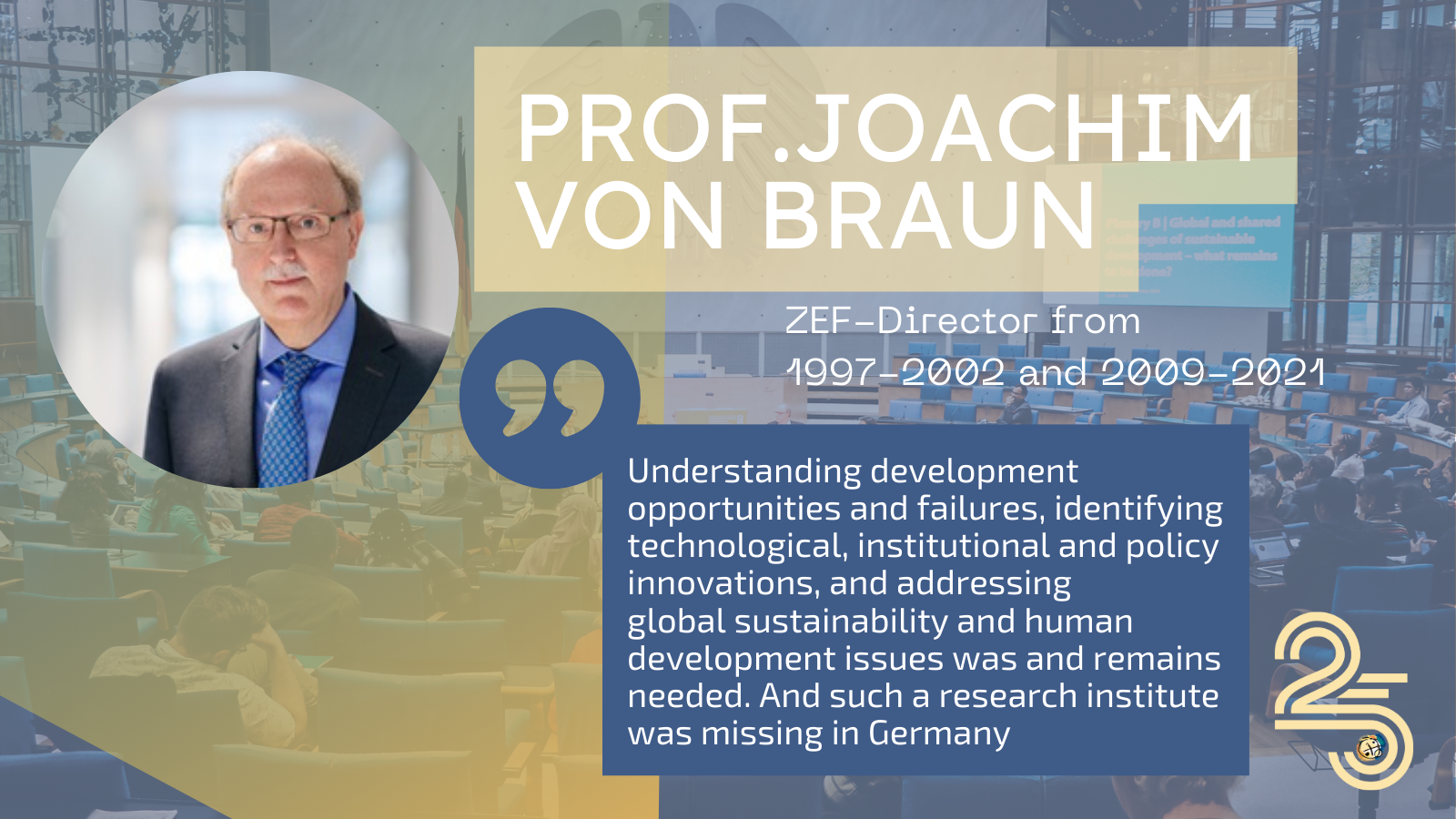Why was ZEF established 25 years ago?
The determinants of ZEF’s establishment can be grouped in “deep causes” and “practical determinants”. The deep causes of establishing ZEF were that a Center for Development Research (ZEF) was (and is) needed. Understanding development opportunities and failures, identifying technological, institutional and policy innovations, and addressing global sustainability and human development issues was and remains needed. And such a research institute was missing in Germany. Demand for research-based advice on development and science policy was growing in Germany, as well as in emerging-economy countries, and at the level of global institutions such as UN and World Bank.
The practical determinants of ZEF’s establishment resulted from Germany’s transformation in the global and European context. Without the fall of the Berlin Wall in 1989 the federal government would not have moved from Bonn to Berlin, Bonn would not have gone through a process of internationalization, and there would have been no ZEF. Thus, this broad set of felt needs led to ZEF’s establishment. ZEF was founded as a Bonn University-based institute with the aim of providing development research insights for global benefits, and serve Germany, North Rhine Westphalia and the region of Bonn with an international agenda.
What were the main agenda items on the development research agenda at the time?
At the time ZEF was founded, the development agenda had been shaped by the United Nations Conference on Environment and Development (UNCED), also known as the ‘Earth Summit’, held in Rio de Janeiro, Brazil, 1992. Actually, I participated in this Summit, and it influenced my own thinking as well as ZEF’s early research agenda. Klaus Töpfer, the first Chair of the ZEF Advisory Board, played a crucial role in making the Rio Conference a success. The conference recognized that integrating and balancing economic, social and environmental dimensions required new ways of how we produce and consume.
This concept was new at the time. Major outcomes of the UNCED Conference were: The Agenda 21, calling for new strategies to invest in the future in order to achieve overall sustainable development; the United Nations Framework Convention on Climate Change (UNFCCC); the Convention on Biological Diversity (CBD, also known as UN Biodiversity); and the United Nations Convention to Combat Desertification (UNCCD). From its beginning, ZEF-research has related to all these Conventions and Agendas. The founding document of what eventually became ZEF actually mentioned a “North-South Centre for Development Research”. But the North-South terminology appeared inappropriate to us for a research institute that was meant to address complex issues of change at global, regional and local levels. Thus, we asked Bonn University’s leadership to call it “Center for Development Research (ZEF)”.
ZEF’s initial research agenda comprised research on development, change and capacity building. The latter was implemented through the doctoral studies program, designed as an integral part of ZEF’s research agenda. The ambition was to position ZEF on the international map of leading development research institutes and think tanks. Working with and achieving sound theoretical underpinnings, a relevant empirical basis, as well as implementing cutting-edge methodologies, all applied to inter- and transdisciplinary approaches, were among ZEF’s strategy. Thematically, ZEF was positioned around the key issues of poverty and inequality, environmental and ecological problems, gender, behavioral change, governance and conflicts. We did not want the agenda set by the team in Bonn, but rather work it out in close cooperation with our international research partners, while taking the advice of ZEF’s high-level International Advisory Board into account.
In your opinion: What have been ZEF’s main achievements and what the biggest challenges as a research and doctoral educational institute?
When we came to the building allocated as ZEF’s office space in September 1997, removal vans stood on the street. They were about to transport office furniture and accessories belonging to members of the German federal parliament, who had been based at Bonn up to that moment, and were heading for their new premises in Berlin. We moved in without trucks. The first two weeks we had no desks or chairs, not even a computer system. However, we had telephones to order things and a team in Bonn University’s Rectorate supporting us. We quickly worked out organizational, institutional and governance arrangements for ZEF. The enthusiastic spirit of a highly motivated team of administrative, junior and senior research staff members who had moved with the first ZEF Directors – partly from their previous positions or newly recruited – also made things work. The lights in the building remained switched on until late nights. Everyone saw it as a unique opportunity to build a new institution of tremendous relevance.
A main achievement of ZEF was the fast rise in numbers of high-quality peer-reviewed publications. The first external evaluation of ZEF, which was conducted in 2002, concluded, “The evaluation commission was deeply impressed by ZEF’s achievements in a relatively short period in the areas of teaching, research and knowledge transfer”. A major challenge consisted in building peer culture across disciplines among people from all over the world. The design of a strategy for the whole institute and not just for three departments took time and willingness to listen. Another challenge was financing ZEF. The institute had been endowed with funding for the first 10 years of operation only. But, we were committed to make sure there was a vibrant ZEF beyond its first 10 years. So all of us had to learn from the beginning that partnership-building and fundraising efforts were necessary for a sustainable future of the institute. This became part of ZEF’s DNA and probably enhanced the institute’s relevance and research quality.
ZEF and its doctoral program turn 25 this year: What are your wishes but also suggestions for their future agenda?
The first ZEF evaluation in 2002 concluded, “With the doctoral program, ZEF can live up to the claim of “uniqueness” in the German university landscape in a very special way.” The jump-start of the program was only possible with an international topnotch teaching team that supported us. ZEF-lecturers came from all hemispheres and covered a high diversity of disciplines. The landscape of doctoral programs in Bonn and elsewhere has changed a lot since then and many other excellent English-language doctoral programs have been initiated in Germany. Still, ZEF’s Doctoral Program has uniqueness, as it combines and connects bottom-up perspectives from each new doctoral student with the institute’s overall strategic orientation. Transdisciplinary research and advanced methods serve sustainable transformation of economic, social and ecological systems and can pave the way toward circular and more bio-based economies. Macro-economic themes including finance and trade, as well as institutional and technological innovations are of long-term strategic relevance. Jobs, climate, biodiversity, health & nutrition, and an eye on game changers such as AI, robotics, and energy innovations remain areas of impactful opportunity. In the future, ZEF post-docs should also be equipped with skills to lead development research in the academic space. However, it may serve development and ZEF doctoral students if they were more equipped with capacities to become innovative start-up founders in the knowledge economy. ZEF operates in a highly competitive environment. Yet, that is best coped with in a culture of caring for each other: Among to the researchers and their families at ZEF, as well as their research partners worldwide.
Joachim von Braun was ZEF-Director from 1997-2002 and 2009-2021



Leave a Reply